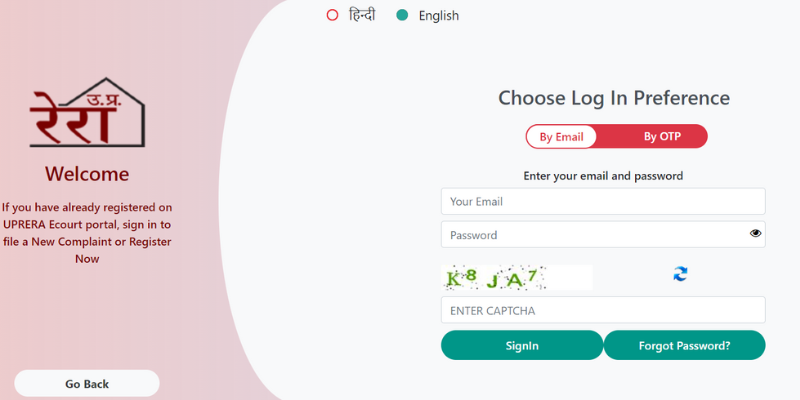Uttar Pradesh has designated UP-RERA as the official entity in charge of overseeing and advancing the state’s real estate development. In India, Uttar Pradesh has always had the largest population. This state has a comparatively high population density, and the area is rapidly becoming more urbanised. After the passing of the Real Estate (Regulation and Development) Act of 2016, Uttar Pradesh was among the first states to put it into effect.
Table of Contents:
- What is UP RERA?
- Objectives of the UP RERA
- Key Features and Provisions of UP RERA
- Benefits of UP RERA for Homebuyers
- Understanding UP RERA Complaints and Dispute Resolution
- How to File a Complaint on UP RERA?
- Tracking Your Complaint
- Conclusion
- FAQ’s
What is UP RERA?
The Real Estate (Regulation and Development) Act of Uttar Pradesh, or UP RERA, is a piece of law that was passed in the Indian state of Uttar Pradesh to promote transparency and regulate the real estate industry. RERA UP is a state-specific version of the federal RERA Act that has been tailored to meet the particular needs and obstacles of Uttar Pradesh’s real estate industry.

Objectives of the UP RERA
The following are the objectives of UP RERA:
- Keeping Real Estate Transactions Transparent.
- Defending Home Buyers’ Interests.
- Establishing a Real Estate Sector Regulatory Authority.
- Ensuring Real Estate Projects Are Completed on Time.
Ensuring Transparency In Real Estate Transactions:
By requiring developers to provide prospective purchasers with all pertinent information about their properties, UP RERA seeks to increase openness in the real estate industry. This contains information on the project’s dimensions, the number of units, the status of approvals, and the estimated completion date.
Protecting The Interests Of Homebuyers: By
The interests of purchasers. It gives homeowners a forum to voice their problems and seek resolution for their issues with developers.
Establishing a Regulatory Authority For The Real Estate Sector:
In Uttar Pradesh, the real estate industry is governed by UP RERA. It guarantees that developers abide by the RERA Act’s terms and prosecute those who do not follow the guidelines.
Ensuring Timely Completion Of Real Estate Projects:
The goal of UP RERA is to guarantee that developers finish their projects on schedule. It establishes deadlines for project completion and penalizes developers who don’t reach these deadlines.
Also Read: Will RERA empower the Real Estate builders?
Key Features and Provisions of UP RERA
The following are the principal clauses of UP RERA:
- Real estate project registration.
- The creation of a regulatory body.
- Regulatory Authority Responsibilities and Duties.
- Adjudication of Disputes.
- Penalties for Failure to Comply.
Registration of Real Estate Projects: Before advertising or marketing such projects, developers must register them with UP RERA. They ought to include all pertinent information regarding the project, including its size, location, estimated completion date, and approval status.
Establishment Of A Regulatory Authority: UP RERA has the jurisdiction to create a regulatory body to oversee the state’s real estate industry. The authority bears the responsibility of upholding the RERA Act’s provisions and guaranteeing developers’ compliance.
Duties and Responsibilities Of The Regulatory Authority: The UP RERA-established regulatory body is responsible for upholding a database of registered projects, ensuring developers follow quality guidelines, giving homebuyers a way to complain about developers and mediating conflicts between developers and buyers.
Adjudication of Disputes: Homebuyers have a way through UP RERA to file complaints against developers and get their problems addressed. The regulatory body is in charge of resolving these disagreements and penalizing developers who break the regulations.
Penalties for Non-Compliance: The regulatory body can penalize developers who violate the terms of UP RERA. Penalties might include fines, registration revocation, or imprisonment.
Also Read: Haryana RERA
Benefits of UP RERA for Homebuyers
Here are the benefits of RERA for home buyers in Uttar Pradesh
Increased Transparency: Project registration is required by UP RERA, giving purchasers access to verified project information and encouraging informed choices and openness in real estate transactions.
Reduced Risk of Project Delays: By constantly monitoring project deadlines, UP RERA reduces delays, guaranteeing prompt possession to purchasers and reducing the danger of prolonged construction uncertainty.
Improved Consumer Confidence: By providing legal remedies, guaranteeing high-quality buildings, and protecting home buyers’ interests, UP RERA’s grievance redressal process and faults responsibility improve customer trust.
Understanding UP RERA Complaints and Dispute Resolution
How to File a Complaint on UP RERA?

You have the right to register a complaint with UP RERA (Uttar Pradesh Real Estate Regulatory Authority) if you are unhappy with the services provided by a builder, agent, or promoter and think they have not followed the rules outlined in the RERA Act. To start the complaint procedure, take the following actions:
Step 1: Go to the UP RERA website and log in.
Go to the UP RERA official website and sign into your account.
Step 2: Go to the section on complaints
Select the ‘Complaints’ tab from the menu bar at the top.
Step 3 is to file a complaint.
To begin the complaint filing procedure, select “Register Complaint.”
Step 4: Register or Sign in
Use your email address or an OTP to register if you’re a new user. Enter your information, such as your password, address, and name.
Step 5: Give the Required Details
Enter personal information, the kind of complaint, responder details, and other pertinent information after logging in.
Step 6: Pay Complaint Fee Payment
In order to file a complaint, you must pay ₹ 1,000. Cover the cost.
Step 7: Obtain Complaint Number
A distinct complaint number will be generated by the authority following a successful payment. You will be using this number to monitor the progress of your complaint, so keep it secure.
Tracking Your Complaint:
Once your complaint is registered, it’s essential to stay informed about its progress. You can check the status of your complaint through various methods:
- Online: Log in to your UP RERA account and navigate to the ‘Complaints’ section to check the status of your filed complaint.
- Offline: Visit the UP RERA office in person to inquire about the status of your complaint.
- Helpline: Reach out to the designated helpline number provided by UP RERA to get updates on your complaint.
You may guarantee that your complaints are taken seriously and that the required steps are taken to solve the problems you have had with the builder, agent, or promoter by adhering to these guidelines and being involved in the complaint process.
Conclusion
In summary, Uttar Pradesh’s real estate industry is now significantly more regulated thanks to UP RERA. The Act has penalized developers who break the laws and regulations and increased transparency and protection for purchasers. UP RERA has had a good influence on safeguarding homebuyers’ interests, assuring timely completion of projects, and fostering more confidence in the real estate industry, notwithstanding its problems.
Sustained endeavors are essential to tackle the obstacles encountered by UP RERA and guarantee its efficient execution throughout the region. Other Indian states can use UP RERA as a model to control the real estate market and safeguard the rights of homebuyers.
FAQ’s:
1. How does RERA UP Benefit Homebuyers?
Homebuyers benefit from RERA UP through the provision of transparent project information, timely project completion, protection from fraudulent activities, and methods for resolving grievances in the event of conflicts.
2. How Can Homebuyers Register Complaints Under RERA UP?
By presenting their objections to the regulatory authority created under the legislation, homebuyers can lodge complaints under RERA UP. The authority is in charge of arbitrating conflicts and prosecuting promoters or developers who violate the law.
3. What does RERA approval mean?
An agent or real estate project that has received RERA clearance has complied with the rules and regulations established by the Real Estate (Regulation and Development) Act, which promotes responsibility, transparency, and equity in the real estate industry.
4. What is the New Real Estate Law?
The Real Estate (Regulation and Development) Act (RERA), passed in India in 2016, is referred to as the new real estate legislation. It seeks to control the real estate sector, safeguard the rights of homebuyers, and enhance transparency.
5. What is RERA-approved land?
A block of land that satisfies the standards and compliances required by the Real Estate (Regulation and Development) Act is referred to as RERA-approved land. It guarantees purchasers that the project complies with all applicable laws and regulations.


